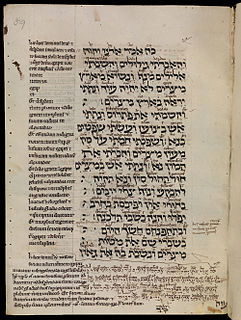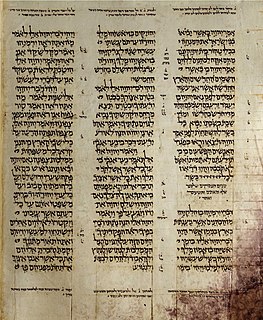Isaiah 1 is the first chapter of the Book of Isaiah, one of the Book of the Prophets in the Hebrew Bible, which is the Old Testament of the Christian Bible. In this "vision of Isaiah concerning Judah and Jerusalem", the prophet calls the nation to repentance and predicts the destruction of the first temple in the siege of Jerusalem. This chapter provides an introduction to the issues of sin, judgement, and hoped-for restoration which form the overarching structure of the whole book. It concludes with 'a reference to the burning of those who trust in their own strength', in a fire which cannot be 'quenched', a relatively rare word which is also used in the last verse of the book, thereby linking together beginning and ending of this whole book. It is traditionally read on the black sabbath immediately preceding the 9th of Av fast day.
Isaiah 42 is the forty-second chapter of the Book of Isaiah in both the Hebrew Bible and the Old Testament of the Christian Bible. This book contains the prophecies attributed to the prophet Isaiah, and is a part of the Books of the Prophets. Chapters 40-55 are known as "Deutero-Isaiah" and date from the time of the Israelites' exile in Babylon. This chapter contains a poem known as the first of the "Servant songs" about the servant, whom Jewish tradition holds that Isaiah identifies as either the Israelites themselves or Cyrus.
Isaiah 2 is the second chapter of the Book of Isaiah in the Hebrew Bible or the Old Testament of the Christian Bible. This book contains the prophecies attributed to the prophet Isaiah, and is one of the Books of the Prophets.
Isaiah 3 is the third chapter of the Book of Isaiah in the Hebrew Bible or the Old Testament of the Christian Bible. This book contains the prophecies attributed to the prophet Isaiah, and is one of the Books of the Prophets. This chapter describes how the corrupt leadership brought about the collapse of the social condition of Jerusalem, and contains Isaiah's prophecies that "For the sin of the people, God will take away the wise men, and give them foolish princes".
Isaiah 13 is the thirteenth chapter of the Book of Isaiah in the Hebrew Bible or the Old Testament of the Christian Bible. This book contains the prophecies attributed to the prophet Isaiah, and is one of the Books of the Prophets. In the New King James Version, the chapter is sub-titled "Proclamation Against Babylon".

Isaiah 14 is the fourteenth chapter of the Book of Isaiah in the Hebrew Bible or the Old Testament of the Christian Bible. This book contains the prophecies attributed to the prophet Isaiah, and is one of the Books of the Prophets.

Isaiah 15 is the fifteenth chapter of the Book of Isaiah in the Hebrew Bible or the Old Testament of the Christian Bible. This book contains the prophecies attributed to the prophet Isaiah, and is one of the Books of the Prophets. This chapter and the following chapter deal with the forthcoming history of Moab.
Isaiah 17 is the seventeenth chapter of the Book of Isaiah in the Hebrew Bible or the Old Testament of the Christian Bible. This book contains the prophecies attributed to the prophet Isaiah, and is one of the Books of the Prophets. The New King James Version describes this chapter as a "proclamation against Syria and Israel".
Isaiah 18 is the eighteenth chapter of the Book of Isaiah in the Hebrew Bible or the Old Testament of the Christian Bible. This book contains the prophecies attributed to the prophet Isaiah, and is one of the Books of the Prophets.
Isaiah 19 is the nineteenth chapter of the Book of Isaiah in the Hebrew Bible or the Old Testament of the Christian Bible. This book contains the prophecies attributed to the prophet Isaiah, and is one of the Books of the Prophets. This chapter focuses on Egypt.
Isaiah 22 is the twenty-second chapter of the Book of Isaiah in the Hebrew Bible or the Old Testament of the Christian Bible. This book contains the prophecies attributed to the prophet Isaiah, and is one of the Books of the Prophets. This chapter contains a prophecy against "untimely rejoicing in Jerusalem" and "a threefold prediction of Shebna's fall, of Eliakim's elevation, and of Eliakim's fall".
Isaiah 23 is the twenty-third chapter of the Book of Isaiah in the Hebrew Bible or the Old Testament of the Christian Bible. This book contains the prophecies attributed to the prophet Isaiah, and is one of the Books of the Prophets. This chapter foretells the destruction of Tyre due to its pride, its rising again, and its conversion to God.
Isaiah 26 is the twenty-sixth chapter of the Book of Isaiah in the Hebrew Bible or the Old Testament of the Christian Bible. This book contains the prophecies attributed to the prophet Isaiah, and is one of the Books of the Prophets. Chapters 24-27 of Isaiah constitute one continuous poetical prophecy, sometimes called the "Isaiah Apocalypse".
Isaiah 30 is the thirtieth chapter of the Book of Isaiah in the Hebrew Bible or the Old Testament of the Christian Bible. This book contains the prophecies attributed to the prophet Isaiah, and is one of the Books of the Prophets. The Jerusalem Bible groups chapters 28-35 together as a collection of "poems on Israel and Judah". The Cambridge Bible for Schools and Colleges describes this chapter as "a series of Oracles dealing with the Egyptian Alliance and its consequences; the present state and future prospects of Israel, and the destruction of the Assyrians".
Isaiah 34 is the thirty-fourth chapter of the Book of Isaiah in the Hebrew Bible or the Old Testament of the Christian Bible. This book contains the prophecies attributed to the prophet Isaiah, and is a part of the Book of the Prophets. The Jerusalem Bible groups chapters 28-35 together as a collection of "poems on Israel and Judah", although this chapter is addressed to all nations and to Edom in particular.
Isaiah 43 is the forty-third chapter of the Book of Isaiah in the Hebrew Bible or the Old Testament of the Christian Bible. This book contains the prophecies attributed to the prophet Isaiah, and is one of the Books of the Prophets.
Isaiah 48 is the forty-eighth chapter of the Book of Isaiah in the Hebrew Bible or the Old Testament of the Christian Bible. This book contains the prophecies attributed to the prophet Isaiah, and is one of the Books of the Prophets. Chapters 40-55 are known as "Deutero-Isaiah" and date from the time of the Israelites' exile in Babylon. According to John Skinner, this chapter, which is "largely a recapitulation of certain outstanding themes of the prophecy", consists of "exhortations addressed to the exiles in the near prospect of deliverance".

Ezekiel 35 is the thirty-fifth chapter of the Book of Ezekiel in the Hebrew Bible or the Old Testament of the Christian Bible. This book contains the prophecies attributed to the prophet/priest Ezekiel, and is one of the Books of the Prophets. This chapter contains a prophecy against Mount Seir in Edom, to the south of Judah. Biblical commentator Susan Galambush pairs it with an oracle promising "restoration to the mountains of Israel" in the following chapter.

Jeremiah 49 is the forty-ninth chapter of the Book of Jeremiah in the Hebrew Bible or the Old Testament of the Christian Bible. This book contains prophecies attributed to the prophet Jeremiah, and is one of the Books of the Prophets. This chapter is part of a series of "oracles against foreign nations", consisting of chapters 46 to 51. In particular, chapters 46-49 focus on Judah's neighbors.

Jeremiah 46 is the forty-sixth chapter of the Book of Jeremiah in the Hebrew Bible or the Old Testament of the Christian Bible. This book contains prophecies attributed to the prophet Jeremiah, and is one of the Books of the Prophets. This chapter is part of a series of "oracles against foreign nations", consisting of chapters 46 to 51. In particular, chapters 46-49 focus on Judah's neighbors. This chapter contains the poetic oracles against Egypt.




